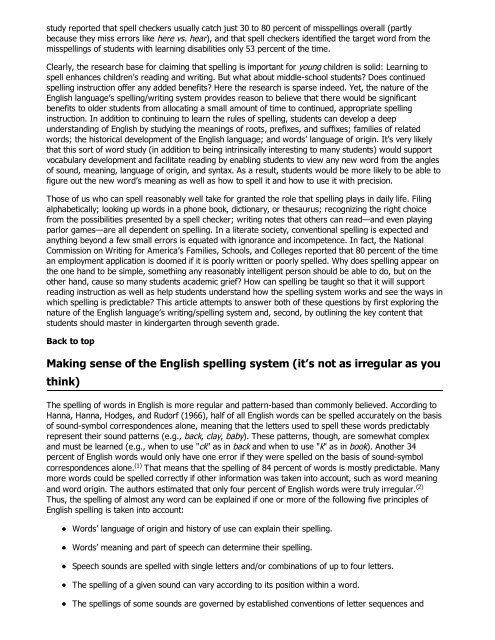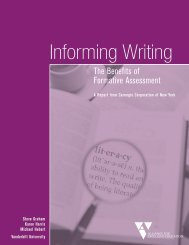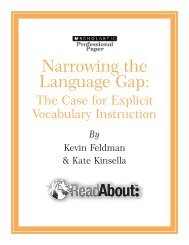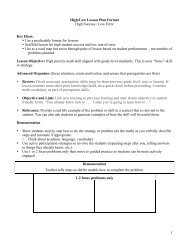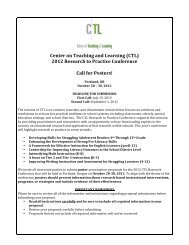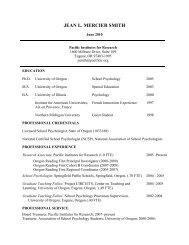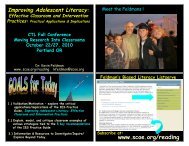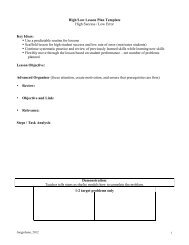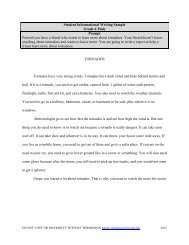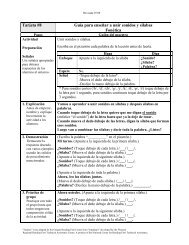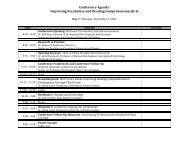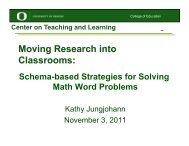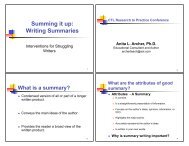How Spelling Supports Reading - Center on Teaching and Learning
How Spelling Supports Reading - Center on Teaching and Learning
How Spelling Supports Reading - Center on Teaching and Learning
Create successful ePaper yourself
Turn your PDF publications into a flip-book with our unique Google optimized e-Paper software.
study reported that spell checkers usually catch just 30 to 80 percent of misspellings overall (partlybecause they miss errors like here vs. hear), <strong>and</strong> that spell checkers identified the target word from themisspellings of students with learning disabilities <strong>on</strong>ly 53 percent of the time.Clearly, the research base for claiming that spelling is important for young children is solid: <strong>Learning</strong> tospell enhances children’s reading <strong>and</strong> writing. But what about middle-school students? Does c<strong>on</strong>tinuedspelling instructi<strong>on</strong> offer any added benefits? Here the research is sparse indeed. Yet, the nature of theEnglish language’s spelling/writing system provides reas<strong>on</strong> to believe that there would be significantbenefits to older students from allocating a small amount of time to c<strong>on</strong>tinued, appropriate spellinginstructi<strong>on</strong>. In additi<strong>on</strong> to c<strong>on</strong>tinuing to learn the rules of spelling, students can develop a deepunderst<strong>and</strong>ing of English by studying the meanings of roots, prefixes, <strong>and</strong> suffixes; families of relatedwords; the historical development of the English language; <strong>and</strong> words’ language of origin. It’s very likelythat this sort of word study (in additi<strong>on</strong> to being intrinsically interesting to many students) would supportvocabulary development <strong>and</strong> facilitate reading by enabling students to view any new word from the anglesof sound, meaning, language of origin, <strong>and</strong> syntax. As a result, students would be more likely to be able tofigure out the new word’s meaning as well as how to spell it <strong>and</strong> how to use it with precisi<strong>on</strong>.Those of us who can spell reas<strong>on</strong>ably well take for granted the role that spelling plays in daily life. Filingalphabetically; looking up words in a ph<strong>on</strong>e book, dicti<strong>on</strong>ary, or thesaurus; recognizing the right choicefrom the possibilities presented by a spell checker; writing notes that others can read—<strong>and</strong> even playingparlor games—are all dependent <strong>on</strong> spelling. In a literate society, c<strong>on</strong>venti<strong>on</strong>al spelling is expected <strong>and</strong>anything bey<strong>on</strong>d a few small errors is equated with ignorance <strong>and</strong> incompetence. In fact, the Nati<strong>on</strong>alCommissi<strong>on</strong> <strong>on</strong> Writing for America’s Families, Schools, <strong>and</strong> Colleges reported that 80 percent of the timean employment applicati<strong>on</strong> is doomed if it is poorly written or poorly spelled. Why does spelling appear <strong>on</strong>the <strong>on</strong>e h<strong>and</strong> to be simple, something any reas<strong>on</strong>ably intelligent pers<strong>on</strong> should be able to do, but <strong>on</strong> theother h<strong>and</strong>, cause so many students academic grief? <str<strong>on</strong>g>How</str<strong>on</strong>g> can spelling be taught so that it will supportreading instructi<strong>on</strong> as well as help students underst<strong>and</strong> how the spelling system works <strong>and</strong> see the ways inwhich spelling is predictable? This article attempts to answer both of these questi<strong>on</strong>s by first exploring thenature of the English language’s writing/spelling system <strong>and</strong>, sec<strong>on</strong>d, by outlining the key c<strong>on</strong>tent thatstudents should master in kindergarten through seventh grade.Back to topMaking sense of the English spelling system (it’s not as irregular as youthink)The spelling of words in English is more regular <strong>and</strong> pattern-based than comm<strong>on</strong>ly believed. According toHanna, Hanna, Hodges, <strong>and</strong> Rudorf (1966), half of all English words can be spelled accurately <strong>on</strong> the basisof sound-symbol corresp<strong>on</strong>dences al<strong>on</strong>e, meaning that the letters used to spell these words predictablyrepresent their sound patterns (e.g., back, clay, baby). These patterns, though, are somewhat complex<strong>and</strong> must be learned (e.g., when to use "ck" as in back <strong>and</strong> when to use "k" as in book). Another 34percent of English words would <strong>on</strong>ly have <strong>on</strong>e error if they were spelled <strong>on</strong> the basis of sound-symbolcorresp<strong>on</strong>dences al<strong>on</strong>e. (1) That means that the spelling of 84 percent of words is mostly predictable. Manymore words could be spelled correctly if other informati<strong>on</strong> was taken into account, such as word meaning<strong>and</strong> word origin. The authors estimated that <strong>on</strong>ly four percent of English words were truly irregular. (2)Thus, the spelling of almost any word can be explained if <strong>on</strong>e or more of the following five principles ofEnglish spelling is taken into account:Words’ language of origin <strong>and</strong> history of use can explain their spelling.Words’ meaning <strong>and</strong> part of speech can determine their spelling.Speech sounds are spelled with single letters <strong>and</strong>/or combinati<strong>on</strong>s of up to four letters.The spelling of a given sound can vary according to its positi<strong>on</strong> within a word.The spellings of some sounds are governed by established c<strong>on</strong>venti<strong>on</strong>s of letter sequences <strong>and</strong>


